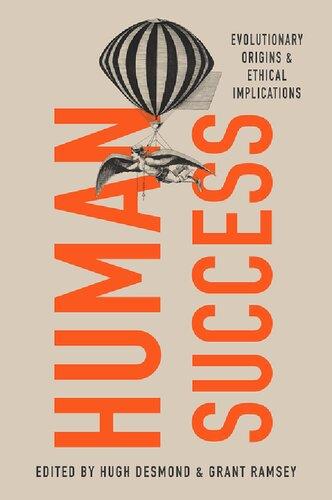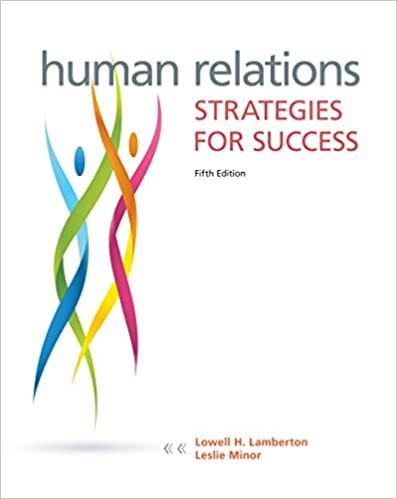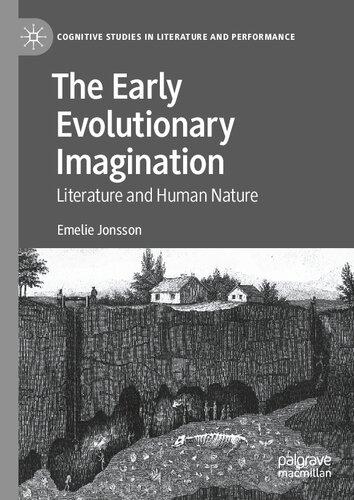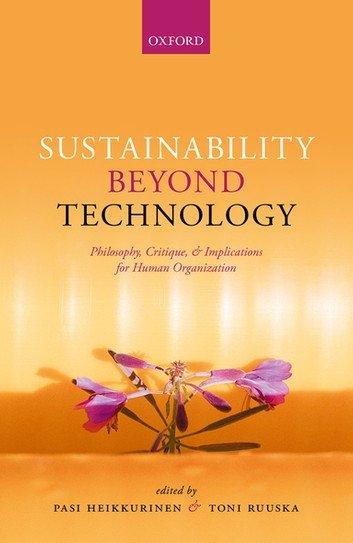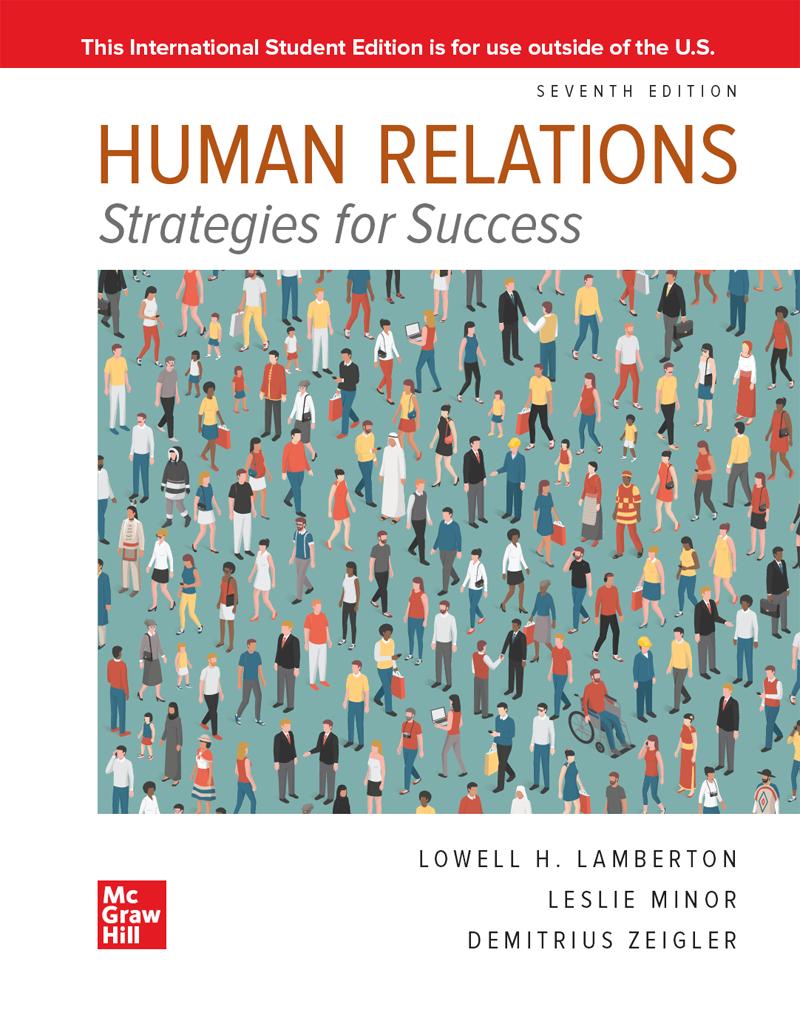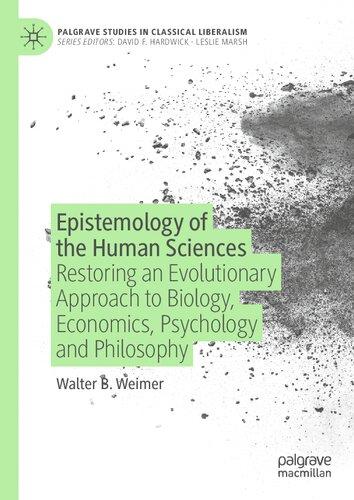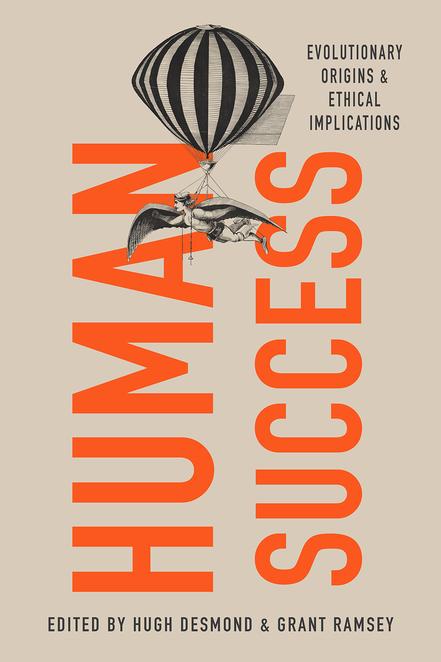Human Success
Evolutionary Origins and Ethical Implications
Edited by HUGH DESMOND AND GRANT RAMSEY
Oxford University Press is a department of the University of Oxford. It furthers the University’s objective of excellence in research, scholarship, and education by publishing worldwide. Oxford is a registered trade mark of Oxford University Press in the UK and certain other countries.
Published in the United States of America by Oxford University Press 198 Madison Avenue, New York, NY 10016, United States of America.
© Oxford University Press 2023
All rights reserved. No part of this publication may be reproduced, stored in a retrieval system, or transmitted, in any form or by any means, without the prior permission in writing of Oxford University Press, or as expressly permitted by law, by license, or under terms agreed with the appropriate reproduction rights organization. Inquiries concerning reproduction outside the scope of the above should be sent to the Rights Department, Oxford University Press, at the address above.
You must not circulate this work in any other form and you must impose this same condition on any acquirer.
Library of Congress Cataloging-in-Publication Data
Names: Desmond, Hugh (Philosopher), editor. | Ramsey, Grant, 1972– editor.
Title: Human success : evolutionary origins and ethical implications / [edited] Hugh Desmond, Grant Ramsey.
Description: New York, NY : Oxford University Press, [2023] | Includes bibliographical references.
Identifiers: LCCN 2022049824 (print) | LCCN 2022049825 (ebook) | ISBN 9780190096168 (hardback) | ISBN 9780190096182 (epub)
Subjects: LCSH: Human evolution—Philosophy.
Classification: LCC GN 281 4 . H 857 2023 (print) | LCC GN 281 4 (ebook) | DDC 599.93/8—dc23/eng/20230103
LC record available at https://lccn.loc.gov/2022049824
LC ebook record available at https://lccn.loc.gov/2022049825
DOI: 10.1093/oso/9780190096168.001.0001
Printed by Integrated Books International, United States of America
List of Contributors vii
1. Introduction: The Manifold Challenges to Understanding Human Success 1
Hugh Desmond and Grant Ramsey
PART I: WHAT IS EVOLUTIONARY SUCCESS?
2. Evolutionary Success: Standards of Value 17
Daniel W. McShea
3. Human Success as a Complex of Autonomy, Adaptation, and Niche Construction 40
Bernd Rosslenbroich
4. Human Success: A Contextual and Pluralistic View 66 Marion Hourdequin
PART II: EXPLAINING HUMAN SUCCESS
5. The Origin and Evolution of Human Uniqueness 91
Geerat J. Vermeij
6. Wanderlust: A View from Deep Time of Dispersal, Persistence, and Human Success 117
Susan C. Antón
7. Culture as a Life History Character: The Cognitive Continuum in Primates and Hominins 144 Matt Grove
8. A Gene-Culture Coevolutionary Perspective on Human Success 188 Kathryn Demps and Peter J. Richerson
9. Anthropocene Patterns in Stratigraphy as a Perspective on Human Success
Jan Zalasiewicz, Mark Williams, and Colin Waters
10. Utter Success and Extensive Inequity: Assessing Processes, Patterns, and Outcomes of the Human Niche in the Anthropocene
Agustín Fuentes
11. Adaptability and the Continuation of Human Origins
Richard Potts
12. Evolving Measures of Moral Success
Allen Buchanan and Rachell Powell
13. Future Human Success: Beyond Techno-Libertarianism
Contributors
Susan C. Antón is the Silver professor of Anthropology, Center for the Study of Human Origins, New York University and studies the anatomy and evolution of early members of the genus Homo. Her pioneering studies of cranial variation in Homo erectus, Homo neanderthalensis, and other Homo species explore the role of (genetic) isolation and local environment in shaping cranial form. Her innovative studies of the dispersal dynamics of early Homo species show that eclectic diets, high mobility, behavioral flexibility, and cohesive social organization contributed to the ability of early humans to move fast relative to other mammals. She is past editor of the Journal of Human Evolution, elected member of the American Academy of Arts and Sciences, and former president of the American Association of Physical (now Biological) Anthropologists. A former Ford Diversity Fellow, she currently serves as Treasurer of the Society of Senior Ford Fellows.
Allen Buchanan was the James B. Duke Distinguished Professor of Philosophy at Duke University and is currently a professor of philosophy at the University of Arizona. He is the author of Our Moral Fate: Evolution and the Escape from Tribalism (2020), The Evolution of Moral Progress: A Biocultural Account (2018, with Rachell Powell), Beyond Humanity: The Ethics of Biomedical Enhancement (2013), The Heart of Human Rights (2013), and eleven other books.
Kathryn Demps is an associate professor in anthropology at Boise State University. She specializes in the study of the evolution of human behavior, focusing on human behavioral ecology and cultural evolution. Her work has explored how humans are flexible decision-makers, using social and ecological contexts to exploit their environment. This has included contexts as diverse as collecting wild honey in south India, outdoor recreation in southwest Idaho, and separating household consumption and production to participate in marketplace exchange.
Hugh Desmond is a research fellow at the Leibniz University of Hannover and assistant professor at the University of Antwerp. He received his PhD in philosophy from the KU Leuven and has held research and visiting positions at the Paris I-Sorbonne, KU Leuven, Princeton University, New York University, and the Hastings Center. He has a strongly interdisciplinary background, with degrees in physics and mathematics (KU Leuven) as well as music performance (Royal Conservatory of Brussels; Conservatory of Paris). His work centers on the philosophy and ethics of science and technology, with particular emphasis on biology. In the latter area, most of his work has centered on the interplay between agency and natural selection in evolutionary
theory, and reflecting about consequences for evolutionary progress, human nature, and human enhancement.
Agustín Fuentes is an anthropologist at Princeton University whose research focuses on the biosocial, delving into the entanglement of biological systems with the social and cultural lives of humans, our ancestors, and a few of the other animals with whom humanity shares close relations. From chasing monkeys in jungles and cities and exploring the lives of our evolutionary ancestors to examining human health, behavior, and diversity across the globe, he is interested in both the big questions and the small details of what makes humans and our close relations tick. Earning his BA/BS in anthropology and zoology and his MA and PhD in anthropology from UC Berkeley, he has conducted research across four continents, multiple species, and two million years of human history. His current projects include exploring cooperation, creativity, and belief in human evolution, multispecies anthropologies, evolutionary theory and processes, and engaging race and racism. Fuentes is an active public scientist, a well-known blogger, lecturer, and tweeter and an explorer for National Geographic. He was recently awarded the Inaugural Communication & Outreach Award from the American Association of Physical Anthropologists and the President’s Award from the American Anthropological Association and was elected to the American Academy of Arts and Sciences.
Matt Grove is a reader in evolutionary anthropology in the Department of Archaeology, Classics and Egyptology at the University of Liverpool. His interests include the Middle Stone Age of Eastern Africa, the effects of paleoclimatic change and variability on hominin evolution and dispersal, the evolution of hominin life history, and the evolution of hominin cognition and culture. He works on developing new quantitative and computational methods for studying the archaeological record. His research focuses on the impacts of climatic change and variability on human evolution, with a particular emphasis on the evolution of behavioral plasticity and its relationship to the archaeological and fossil records of Homo sapiens dispersal.
Marion Hourdequin teaches in the Department of Philosophy at Colorado College and specializes in environmental philosophy. Her research and teaching interests also include ethics, comparative philosophy, animal studies, and philosophy of science. Her current research focuses on climate ethics, climate justice, and the social and ethical dimensions of ecological restoration. She is the author of Environmental Ethics: From Theory to Practice (2015) and the editor, with David Havlick, of Restoring Layered Landscapes (2015). She serves as an associate editor for the journal Environmental Values, is on the editorial board of Environmental Ethics, and is President of the International Society for Environmental Ethics.
Daniel W. McShea teaches in the Department of Biology and Department of Philosophy at Duke University. His earlier work was in the field of paleobiology, where his focus was on large-scale trends in the history of life, especially documenting and investigating the causes of the (putative) trend in the complexity
of organisms. A significant part of this work involved operationalizing concepts such as complexity and hierarchy, as well as clarifying conceptual issues related to trends at larger scales. More recently, he has been interested in teleology, in developing a theory of goal-directedness that explains how all goal-directed systems work, from organismal development and human wanting to the process of natural selection itself. He has three published books: The Missing Two-Thirds of Evolutionary Theory (2020) and Biology’s First Law (2010, both with Robert Brandon) and The Philosophy of Biology: A Contemporary Introduction (2007, with Alex Rosenberg).
Richard Potts is a paleoanthropologist and has been the director of the Smithsonian Institution National Museum of Natural History’s Human Origins Program since 1985. He is the curator of the Hall of Human Origins at the Smithsonian, where he holds the Peter Buck Chair in Human Origins. In partnership with the National Museums of Kenya, he leads ongoing excavations at field sites in southern and western Kenya. After receiving his PhD in biological anthropology at Harvard University in 1982, he taught at Yale before joining the Smithsonian in 1985. His research focuses on Earth’s environmental dynamics and the processes that have led to human evolutionary adaptations. Recent contributions focus on how environmental instability has influenced human evolution, an idea that has stimulated new studies in earth sciences, paleontology, and computational biology. He is also the curator of the exhibit Exploring Human Origins, which has been traveling across the United States since 2015. Among many publications for scientific audiences and educators, he is the author of the exhibit companion book What Does It Mean to Be Human? (2010).
Rachell Powell (formerly Russell) is an associate professor in the Department of Philosophy at Boston University. Holding advanced degrees in philosophy, evolutionary biology, and law, she has published in areas ranging from the philosophy of biology and bioethics to political and legal philosophy. Her recent monographs include Contingency and Convergence: Toward a Cosmic Biology of Body and Mind (2020) and The Evolution of Moral Progress: A Biocultural Theory (2018, with Allen Buchanan). She is currently working on two books: one on the evolution of normativity, and the other on genetic engineering and the future of human nature. She has held fellowships at the National Humanities Center, the American Council of Learned Societies, and the Konrad Lorenz Institute for Evolution and Cognition Research, and she has been a principal investigator on grants from the Templeton World Charity Foundation, National Endowment for the Humanities, the John Templeton Foundation, and the Mellon Foundation. She served from 2011 to 2016 as associate editor for the Journal of Medical Ethics.
Grant Ramsey is a BOFZAP Research Professor in the Institute of Philosophy at KU Leuven, Belgium. His work centers on the philosophical problems at the foundation of evolutionary biology. He has published widely in this area as well as in the philosophy of animal behavior, human nature, and the moral emotions. He has published
three books: Chance in Evolution (2016, with Charles Pence), The Dynamics of Science (2022, with Andreas De Block), and Human Nature (2023).
Peter J. Richerson is a Distinguished Professor Emeritus at the Department of Environmental Science and Policy, UC Davis. He is best known for his seminal work on cultural evolution. Much of this work is summarized in his 2005 book with Robert Boyd, Not by Genes Alone: How Culture Transformed Human Evolution. He continues to publish in this field, coediting a 2013 book, Cultural Evolution: Society, Technology, Language, and Religion, with Morten Christiansen. He was trained as a limnologist and has worked at Lake Tahoe, Lake Titicaca, and Clear Lake. He is past president of the Evolutionary Anthropology Society, the Human Behavior and Evolution Society, the Society for Human Ecology, and the Society for Cultural Evolution.
Bernd Rosslenbroich is an evolutionary biologist at Witten/Herdecke University, Germany. He is interested in the study of major transitions in animal and human evolution. The approach of his team is to analyze morphological and physiological patterns and trends and then to learn about underlying processes. In addition he is interested in organismic concepts of biology which take due account of the specific characteristics of the organism.
Geerat J. Vermeij is a Distinguished Professor of Marine Ecology and Paleoecology at the University of California, Davis. He is probably best known for his work chronicling the arms race among long-extinct mollusks and their predators. By examining and analyzing fossils for evidence of interspecies competition and predation, Vermeij has prompted the field of paleobiology to acknowledge the profound influences creatures have on fashioning each other’s evolutionary fates. Vermeij has more than 280 publications, including six published books as well as papers in such leading journals as Paleobiology, Science, American Naturalist, and the Philosophical Transactions of the Royal Society B. He served as editor for Evolution; received a MacArthur Fellowship, the “genius” grant, in 1992; and in 2000 was awarded the Daniel Giraud Elliot Medal from the National Academy of Sciences. He was elected to the American Academy of Arts and Sciences in 2021 and the National Academy of Sciences in 2022.
Colin Waters is an honorary professor at the University of Leicester and chair (and former secretary) of the Anthropocene Working Group (AWG) of the Subcommission on Quaternary Stratigraphy, the body investigating the Anthropocene as a potential geological time unit. He was lead author of the high-impact 2016 Science paper on the Anthropocene and has had a central role in coordinating AWG activities in seeking formalization of the Anthropocene as a stratigraphic unit. He was formerly principal scientific officer with the British Geological Survey, with a 29-year career in which he developed particular expertise in the geology of British strata of the Carboniferous age (approximately 300 to 360 million years ago). Such strata have historic significance as a major source of minerals, including coal, but are also associated with much
of the industrialization and urbanization of parts of the United Kingdom, which led to his interest in anthropogenic processes as a component of contemporary geology.
Mark Williams is a professor of paleobiology at Leicester University. He is a member (and former secretary) of the Anthropocene Working Group. His work is predicated on understanding major innovations in the biosphere over geological time. The coauthor, with Jan Zalasiewicz, of the popular science books The Goldilocks Planet (2012), Ocean Worlds (2014), Skeletons (2018), and The Cosmic Oasis (2022). He coauthored the book The Anthropocene: A Multidisciplinary Approach (2020, with Jan and Julia Thomas).
Jan Zalasiewicz is emeritus professor of geology (paleobiology) at the University of Leicester. He is a member, formerly the chair, of the Anthropocene Working Group of the International Commission on Stratigraphy and the current chair of the Subcommission on Quaternary Stratigraphy. The author of many articles and books, he recently coedited The Anthropocene as a Geological Time Unit (2019). In 2008 he and his colleagues put forth the first proposal to adopt the Anthropocene Epoch as a formal geological interval.
The Manifold Challenges to Understanding Human Success
Hugh Desmond and Grant Ramsey
1. Introduction
We often speak of our own species as being remarkably—or even uniquely— successful. As one would expect, such talk of “human success” can most often be found in popular science communications, such as newspapers or magazines, where the human species may be termed an “evolutionary success story” (Tarlach 2018) or, in a similar vein, “the dominant species on our planet” (Stringer 2019). The word “success” clearly speaks to the imagination. While “success” is probably not viewed as sufficiently precise to be of use in academic contexts, this way of speaking about humans does sometimes appear in academic and semi-academic contexts as well, usually in passing and as a starting point for scientific inquiry and explanation. For instance, some take the success of humans compared to other primates and large mammals as an explanandum for further inquiry (Sterelny 2012). Others see humans as a comparatively successful species tout court (Henrich 2016). In yet other places, humans are simply introduced as “undoubtedly the most successful species on Earth” (Smith 2020, 1).
Drawing attention to the language of “success talk” in this way will inevitably give the impression that this volume is merely skeptical of such language. This is not the case. However, the word “success” has multiple layers of meaning, and the mere fact that scientists turn to that word as a hook for a broader audience indicates that we are all, at some level, aware of these layers. Saying that the human species is a “success” draws the attention in ways that neutral, factual descriptions (e.g., “humans are bipedal, large-brained primates”) do not.
At first sight, “success” could seem to be simply a neutral shorthand for some type of descriptive species-level metric, including geographic range; ecological dominance (as measured, for instance, by the consumption of biomass production in ecosystems); or population size. In this narrowly circumscribed sense, attributing success to humans is no different from the way success is attributed to an ant or bird species spreading around the globe or to some now extinct species that once roamed the Earth. According to such an analysis, there is not one single metric of species success, but many different metrics, and different species can be successful in different ways. It may be difficult to think of another large animal that comes close to Homo sapiens in population size or ecological dominance (except perhaps for the domesticated animals that humans breed for consumption), but what about species whose worlds take place at much smaller spatial scales and who are more or less oblivious to the evolution of the human species? Tardigrades— the phylum of minuscule eight-legged creatures known as “water bears”— come to mind as a very successful species in terms of population size or geographic range but that do not compete directly with the human species, being about four orders of magnitude smaller in body size.
If such analyses exhausted the meaning of “success,” we could stop here and there would be no need for a volume on the subject. However, the concept of success connotes far more than the growth or persistence of species. As a usage of “success” that may seem at first entirely unrelated, think of how ethicists are traditionally concerned with the question What is the good life? For Aristotelian and neo-Aristotelian thinkers, who ascribe a purpose or teleology to human life, a life can be a “success” when that purpose is realized. For some neo-Aristotelians, human success involves the realization of intrinsic human capacities, especially cognitive capacities (e.g., Nussbaum 2000). Such a concept of human success depends on a concept that is perhaps even more controversial: human nature.
Of course, today many biologists, evolutionary anthropologists, and philosophers of biology are skeptical of the existence of human nature, or of the usefulness of the concept (see Hannon and Lewens 2018). However, human success need not be understood in relation to human nature. For a different understanding of human success, think of the expression “He was driven by a desire for success.” The expression does not conjure up the image of a Socratic figure endeavoring to live a life of rational virtue. Instead, it calls to mind an individual who sacrifices friends, family, or even personal well-being in the pursuit of wealth, social status, or professional or political
success. Success here connotes having power rather than the good, and illustrates how success has an ambiguous ethical status.
It is tempting to think that this ambiguity helps explain our attraction to the word “success”: it seems like a good fit for a globalized, competitive era. Like a burger restaurant hitting on a successful formula and turning into a franchise invading markets worldwide, the human species seems to have hit on a pattern of behavior that has allowed it to invade ecosystems radically different from the ones primates typically inhabit. Or, like the successful influencer, the human species has “gone viral.” In the process, humans have spread over the Earth and settled in regions as diverse as deserts, arctic tundra, and tropical rainforests. In so doing, the human population has risen many orders of magnitude above that of other primate species.
These comparisons only underline the darker side of human success. In the analogy with the burger franchise, invading new markets means that mom-andpop restaurants are put out of business, straining the conditions of employment as well as the involvement of local communities. Similarly, the success of the human species has disrupted ecosystems and caused biodiversity to decrease. One could compare the way in which the human species exploits and manages nonhuman species with the way colonial powers both exploited other societies and governed them according to their own cultural ideas and norms.
These overtones evoked by the word “success” illustrate how human success is not merely a causal-descriptive concept that can be neatly captured by empirical metrics. And herein lies the danger: in reflecting on the success of the human species, we need to carefully consider whether we are just exporting our anthropocentric conceptions about what it is to be successful, either in terms of ethics or power. This dimension of success was anticipated by E. O. Wilson (1990, 19) in a passing remark in his overview of the ecology and evolution of social insects:
“Success” and “dominance,” laden with the history of Western culture, are risky words to use in biology. But they are nonetheless used all the time and sometimes interchangeably. We intuitively feel them to be necessary words in the biological vocabulary. Indeed, some kinds of organisms are successful and dominant. There is real biology in the distinction, and neologisms that we might invent would not be welcomed.
In a sense, the present volume aims to unpack the elements present in this quote. We agree that there is real biology in the term “success” and at the
same time agree that the social and political connotations cannot be ignored. The term sits uneasily at the interface between evolutionary biology and ethics and raises many of the same types of issues—albeit in a more contemporary guise—that the concept of evolutionary progress did for many 20thcentury evolutionary thinkers.
2. Success and Progress
The history of biological thought is replete with concepts that at first seem to describe a causal state of affairs but that, once scratched, reveal an underlying ethical-normative layer. Aristotelian biology would, of course, be the most obvious example, where the causal and the ethical are fused: the ethical good for humans, eudaimonia, is the fulfillment (telos) of human potentialities in a way that is structurally identical to how the oak tree represents the fulfillment of the acorn. However, concepts that muddle the fact-value distinction are not strange to the Aristotelian framework. Only in a post-Darwinian intellectual landscape, where the main mechanism of adaptive change (natural selection) seems to have nothing to do with what is ethically good, do they become puzzling phenomena.
Historically, the concept of evolutionary progress is one of the most important examples of such a muddling of facts and values, causes and reasons. On the one hand, progress seems to describe—and even causally explain—a state of affairs (namely, large-scale trends). On the other, it also judges the later states of affairs to be somehow “better” than the earlier ones. As intellectual heirs to the Enlightenment, it was difficult for 19th- and 20th-century naturalists to resist viewing the history of life and human evolutionary history in analogous terms.
Darwin’s own views on progress are notoriously ambiguous (cf. Ruse 1996, 136–177; Richards 1988). Even though he made liberal use of the terms “higher” and “lower” in his references to taxa, he also worried about whether their use implied using humans as the standard of comparison. For example, in an 1854 letter to J. D. Hooker, he reflects on the concept:
With respect to “highness” & “lowness,” my ideas are only eclectic & not very clear. It appears to me that an unavoidable wish to compare all animals with men, as supreme, causes some confusion; & I think that nothing besides some such vague comparison is intended, or perhaps is even possible,
when the question is whether two kingdoms such as the articulata or mollusca are the highest. (Darwin 1854)
In a similar vein, Darwin initially preferred to avoid the term “evolution” in favor of “transmutation” or “descent with modification,” since “evolution” (from the Latin e-volvere: unrolling or unfolding) had the preformationist connotations of the unrolling of a predetermined plan, usually from a simple beginning to a more complex final state (Bowler 1975).
Reflecting the spirit of his times, Darwin (1871) was more overtly progressionist in his Descent of Man, for instance with his distinction between “savages” and “civilized man.” Around the same time, Galton (1869) was using the theory of natural selection in order to draw eugenic lessons about the future of the human species. The ethical and political implications of the theory of natural selection seemed straightforward for 19th-century philosophers and naturalists: the lower socioeconomic classes were outreproducing the higher ones, and this distortion of natural selection seemed to imply the “degradation” of the human species. The eugenicist response was that various forms of artificial selection were needed to counteract this development; not only would this prevent the degradation of the human species, but through judicious interventions on reproduction patterns, this artificial selection could help the human species (and indeed all of evolution) enter a new era of progress. In this way, the eugenicist concept of evolutionary progress drew on the lawlike normativity of the theory of natural selection in order to make judgments on how to control human evolution and steer it toward more ethically desirable states of affairs (for an example, see Huxley 1936).
How should the concept of evolutionary success be situated vis-à-vis that of progress? First, the concept of success does not seem to have the same baggage as progress does, and not merely because it has played a less prominent role in the history of biology. It seems to be more straightforward to present “success” as ethically neutral, precisely because it can be operationalized with precise metrics (population size, geographic range, etc.). By contrast, progress depends on the operationalization of “higher” and “lower,” which in turn depends on concepts such as complexity that are not operationalizable, or only with considerable simplification (e.g., where complexity is measured in terms of the number of part types: McShea and Brandon 2010). This is part of what is attractive about talking about success: it seems to involve neutral observations based on clearly definable metrics.
At a conceptual level, success and progress may indeed be distinct. Holding that one species is more successful than another does not imply that the former represents “progress” over the latter. If the human species is deemed a remarkable evolutionary success, this does not necessarily imply that it represents a pinnacle of progress, any more than it should imply that opossums are the pinnacle of marsupial evolution. Nonetheless, success and progress are not wholly independent either. Success-talk recalls historical terminology that we now tend to reject. Think of how, in older textbooks (Matthew 1928; Colbert 1955, 1965), ecologically dominant taxonomic groups would be used to categorize geological epochs. Thus, paleontologists spoke of the “Age of Reptiles” to refer to the Mesozoic, and the “Age of Mammals” to refer to the Cenozoic. (Today, curiously, only the “Age of Man” phrase remains, under the guise of the “Anthropocene.”)
This language can be seen as progressivist in the following sense: if one taxon wanes in dominance, only to be replaced by another dominant taxon, it is a psychologically small (though not logically valid) step to conclude that the later taxon is “more dominant” than the earlier taxon. This inference of course presupposes that the success of various species or other taxa can be compared despite living in different epochs and in different circumstances— a presupposition that, at least in general, seems false, even though it may be true under specific circumstances. In fact, when Wilson (1992, 187ff.) used the same phrasing (“Age of . . .”) decades later, it was in connection to a progressivist view of evolutionary history.
3. Success and Human Uniqueness
A second concept that seems both to reflect neutral facts and to entail considerable value judgments is the concept of human uniqueness. Here also Aristotle led the way with a first categorization of humans as the zoon logon, the “rational animal.” The capacity of reason sets humans apart from animals, and much effort in identifying the capacities that set Homo sapiens apart— whether it be toolmaking, language, or culture—could be viewed as variations on the Aristotelian theme.
It would be difficult to understand our fascination with human uniqueness if it were a merely causal-descriptive concept. Such a concept would appear to be almost scientifically trivial. Every species has a unique set of traits (or, more precisely, a unique range of traits), so why care about discovering
what precisely makes humans unique? Matt Grove in this volume starts out with precisely this observation, citing Foley (1987).
When phrased in these terms, it is indeed tempting to dismiss our concerns with human uniqueness as an antiquated form of anthropocentric navel-gazing. However, from a broader philosophical perspective, the concept of human uniqueness plays some crucial normative functions. For instance, without some concept of what sets humans apart from nonhuman animals, the distinction between human and animal rights disappears. Even Peter Singer, the original crusader against speciesism—discrimination on the basis of species instead of on the basis of what matters morally, namely the capacity to suffer and the possession of preferences—held that, in the choice between saving the life of a (healthy, fully developed) human and that of a (healthy, fully developed) nonhuman animal, preference should still be given to the former. When faced with a situation that requires a choice between promoting human welfare and promoting nonhuman animal welfare, even proponents of animal welfare choose the first in general. (Exceptions for Singer, notoriously, can be made when the human in question is disabled or afflicted with neurogenerative diseases.)
In political philosophy also, concepts of moral personality or moral rights are typically grounded on some concept of the unique capacities of humans. In Rawls’s veil of ignorance, individuals are stripped of all traits (personality, socioeconomic class, etc.) except for their reason. The resulting concept of justice has been criticized as discriminatory to those without the requisite reasoning capacities (Sen 1979). However, one can argue that all sentient or agential beings—rational or not—possess moral standing without collapsing the difference in moral status between humans and nonhuman animals. We need not delve further into this issue, but such considerations illustrate how concepts of human uniqueness are not just quaint forms of anthropocentric confabulations: common moral judgments and legal practices currently presuppose it.
As with progress and success, some conceptions of human uniqueness have a darker side. Today we would likely not be entirely comfortable in following Aristotle to the conclusion that the goal of human life is the development of reason, and that this goal is what grounds the superiority of human beings. This line of reasoning introduces too large a gap between the weight given to human needs and the weight given to nonhuman needs, and can ultimately be used to justify the exploitation of nonhumans or of humans lacking a rational capacity.
From this perspective, the concept of success can be used to modify the concept of uniqueness to help to avoid some of those darker connotations. Instead of asking what makes humans superior, one can ask: What is the unique formula that lies behind the success of Homo sapiens? Indeed, a cursory inspection of the properties that are often associated with human uniqueness—problem-solving, toolmaking, language, and cooperation come to mind—shows a striking overlap with some of the properties that are often understood to be causally responsible for human evolutionary success. It suggests a narrative of human evolution where a certain ensemble of unique traits (cooperation, cumulative culture) led to ecological dominance. From this perspective, these traits are not significant in themselves, but only because they provided a way to success.
Whether thinking of the human evolutionary trajectory in terms of success instead of uniqueness or progress can help avoid some of the pitfalls of the latter, or whether success is like the attractive new acquaintance whose character flaws still have to become apparent, is, of course, not a question this volume will be able to answer. However, in problematizing evolutionary success in a systematic, transdisciplinary way, hopefully some of the debate about success can be expedited to come to a balanced judgment.
4. Overview of the Volume
The first part of the volume tackles the question of what human success—or species success, more generally—can mean. This helps to orient the reader, to get a sense of the landscape. However, the chapters in this part do not constitute the last word on the subject, since the second and third parts of the volume explore, respectively, what caused human success and what the ethical implications are of human success. These parts help to further reflect on and critique our understanding of human success.
In the first chapter, Daniel McShea provides a bird’s-eye view of some of the normative dimensions of success and considers how success could reflect the type of normativity of a natural law, but also ethical normativity. He draws on Robert McShea’s distinction between six value standards and discusses to what extent each is applicable to evolutionary success. He makes no firm conclusions about how success should be understood—and even gives reasons to doubt that any firm conclusion can ever be drawn—but does
strike a cautionary note about the work that needs to occur to make evolutionary success a “scientifically wholesome” concept.
The next chapter, by Bernd Rosslenbroich, shows how key factors in success—such as freedom and autonomy—have antecedents in the very structural organization of organisms. Rosslenbroich argues that viewing human evolution in terms of changes in biological autonomy can help undermine false dichotomies between biology and culture, fact and value.
While McShea and Rosslenbroich point to work that would need to occur to place evolutionary success on a scientific foundation, in the last chapter of the first part Marion Hourdequin explicitly argues against reducing success to a scientific concept and holds that it is paramount to maintain a pluralism of success concepts that reflect a pluralism of goals. She illustrates this by discussing how different notions of success are at play in the Anthropocene, and thus her chapter anticipates later chapters devoted to climate change and environmental ethics.
In the four chapters of the second part, we get four perspectives on the causal antecedents of human success: from a paleobiologist, two physical anthropologists, and two biocultural anthropologists. Geerat Vermeij draws on his work on evolutionary escalation and paleoecology to provide a zoomed-out picture of human evolution in terms of resource consumption, competition, cooperation, colonization, adaptation, and evolutionary feedback loops. It is a thought-provoking read for those interested in the big picture. Vermeij also discusses the roles of predictability and contingency in human evolution.
Susan Antón’s chapter focuses on a shorter time span of human evolution—that of Homo and, in particular, examines the evolutionary fate of Homo erectus. Like H. sapiens, H. erectus dispersed across a vast territory, far beyond any of its hominin or primate ancestors. In accounting for this broad ecological tolerance, Antón reviews and examines the evidence for developmental plasticity in H. erectus, that is, its capacity to develop differently (and adaptively) in different environments. There are clear, largefeature differences with H. sapiens (the latter has much shorter intervals between offspring and achieved a much higher population density compared to H. erectus), but the fact remains that H. erectus was quite successful by our own standards, and yet is now extinct. By some measures, it was more successful, having persisted for two million years—something that cannot yet be said of our own species.
Matt Grove concentrates on one crucial feature of human evolution: how increasing brain sizes (encephalization) went hand in hand with life history changes (especially a longer life expectancy and a longer youth). This implied a vast range of further changes, for instance how human infants required increasing amounts of nurturing and parental (and especially maternal) investment. Grove’s hypothesis is that encephalization slowed our ancestors’ reproductive rate and that this slowed the rate of biological evolution; given heterogeneity in the environment, this provided the conditions in which the capacity for culture would be adaptive. In short, the human capacity for culture—a core part of the story of human success—did not evolve as a direct consequence of larger brain size but rather because increasingly large brains meant hominins did not reproduce as rapidly and thus could not adapt to changing environments through genetic evolution alone.
Kathryn Demps and Peter J. Richerson, in the final chapter of Part II, also examine the rise of culture in human evolution and its role in human success. They use a gene-culture coevolution framework and focus on human evolution over approximately the past 50,000 years. They cover some of the same ground on encephalization as did Grove, and review how, once human populations grew large enough, and perhaps also in response to intense climate variation, the rate of cultural adaptation increased significantly around 50,000 years ago. This rate increased after the last ice age, intensified by a feedback loop between increased exploitation of natural resources, increased human population size, and increased technological and social innovation. Their narrative ends at the Anthropocene, and given the explosive growth of the human species in what amounts to less than the blink of an eye in evolutionary terms, they are clearly cautious about whether H. sapiens should already be deemed an evolutionary success.
The implied threat that the Anthropocene is actually the start of an ecological collapse brings us to the final part of the volume, which concerns the ethical implications of success. Geologists Jan Zalasiewicz, Mark Williams, and Colin Waters review the evidence for the claim that the human global impact marks the beginning of a novel geological epoch. They give us an accessible and informative primer on the subject matter and proceed with a big-picture discussion of the coevolutionary processes occurring at a global scale—and they advance the notion of “technosphere” in analogy to the biosphere, lithosphere, and atmosphere to help make sense of these processes.
Agustín Fuentes discusses what human success should look like in the Anthropocene from the perspective of a primatologist and biocultural
anthropologist. He draws on the conceptual resources of recent developments in evolutionary biology (under the banner of the extended evolutionary synthesis) in order to highlight the epigenetic, behavioral, and cultural channels of inheritance beyond the genetic channel. Fuentes uses this to ground a concept of human success that goes beyond population size or geographic expansion: level of equity. In other words, the human species cannot count itself “successful” unless its individuals receive opportunities for flourishing and expressing their capabilities.
Richard Potts sketches a vision for future human success from the perspective of a physical anthropologist who has studied how climates have warmed up and cooled down many times since the dawn of the genus Homo. We seem now to be faced with worrying and unprecedented change. Nonetheless, drawing on previous work, Potts reminds us that adaptation to environmental uncertainty is a recurring theme in the story of human evolution— the motor that has driven many key changes in the past. What precise forms this adaptability will take is difficult to say, but since what is required is an unprecedented level of international cooperation, it will likely come in the guise of novel organizational networks as well as novel cooperative moral frameworks. What may be happening is unprecedented, but then again, “unprecedented” is business as usual for Homo sapiens.
The subject of human flourishing is central to Allen Buchanan and Rachell Powell’s chapter, where they draw on their work on the evolution of morality to propose a view in which “human success” should be measured in terms of inclusivist morality. In other words, human success involves expanding the circle of moral concern far beyond what could be considered “adaptive” in terms of reproductive success alone. Concepts such as human rights or animal well-being illustrate how humans have created conditions allowing for flourishing and, in the process, leveraging the plasticity of our (moral) cognition to resolve issues far beyond the problems of social cooperation our moral psychology originally was selected for.
Implicit in Buchanan and Powell’s emphasis on cognitive plasticity is a criticism of the idea that technological enhancement should play an outsized role in engineering human (moral) success. The idea that we can and should control future human evolution through physical interventions on human genotypes and phenotypes is an old one—going back to eugenics—but remains quite alive today. After all, could we not solve all the problems associated with the Anthropocene—ranging from our tendency to overexploit natural resources to our exclusivist or tribal behavioral patterns—by technologically
enhancing our brain in some fashion? This idea is explicitly targeted by Hugh Desmond in the last chapter of the volume, where he lays out the evolutionary rationale often given for “techno-libertarian success” and concludes that it is poorly supported by what we know about human cultural evolution. Instead, concepts of future human evolutionary success should explicitly integrate community-level (and not just species-level or individual-level) metrics.
5. Whither Human Success?
Even though an edited volume should raise more questions than it answers and present more divergence than convergence in views, some common themes are woven throughout the chapters. The first is the frailty of human success: even in merely eco-evolutionary terms, current success is no guarantee of future success. The second is the incompleteness of this concept of success, even from a purely causal-evolutionary perspective: there has been much more to human evolution than maximizing population size or resource extraction, and the reasons why—our cooperation, our adaptability, our cognitive plasticity, our communal culture, and so on—are crucial to a more satisfactory notion of human success. Any hard distinction between biology and culture, genes and values, is hard to justify in the case of human success.
One worry worth highlighting is Daniel McShea’s early warning that success may be yet another “obnoxious” and “untestable” notion (as S. J. Gould judged the concept “progress” to be: see discussion in Desmond 2021) that is best either avoided or neutered into a more acceptable concept. In this sense, success may indeed be considered the offspring of progress—even though that would not be a lineage to be proud of. However, in later chapters it becomes clear that other concepts of human success seem possible—ones that are inclusive, community-oriented, or focused on flourishing—that are at least not obviously obnoxious. This would be a different kind of heir, one inheriting the value-ladenness of the parent concept, but without some of its baggage.
However, even in the latter case, questions remain. Do these involve an unacceptable imposition of contingent value standards onto interpretations of the human evolutionary sciences? A number of contributions try to square success with pluralism, even though speaking of success implies the possibility of failure, and thus that some social configurations or ways of living would need to be judged to be such. What rational response, beyond
appealing to one’s own moral intuitions, could be given to one disagreeing with such a concept of success? Must one flesh out inclusive, pluralistic concepts of success in terms of power or exploitation? The concept of human success opens up new opportunities to revisit old questions about facts and values, evolution and ethics, and about how human evolutionary history should be understood.
References
Bowler, P. J. 1975. “The Changing Meaning of ‘Evolution.’” Journal of the History of Ideas 36 (1): 95–115. https://doi.org/10.2307/2709013
Colbert, E. H. 1955. Evolution of the Vertebrates: A History of the Backboned Animals through Time. New York: Wiley.
Colbert, E. H. 1965. The Age of Reptiles. New York: W. W. & Norton. Darwin, C. 1854. “Letter No. 1573.” Darwin Correspondence Project. Accessed December 13, 2021. https://www.darwinproject.ac.uk/letter/?docId=letters/DCPLETT-1573.xml.
Darwin, C. 1871. The Descent of Man. New York: D. Appleton. Desmond, H. 2021. “The Selectionist Rationale for Evolutionary Progress.” Biology & Philosophy 36 (3): 32. https://doi.org/10.1007/s10539-021-09806-1
Foley, R. 1987. Another Unique Species: Patterns in Human Evolutionary Ecology. Harlow: Longman Scientific & Technical.
Galton, F. 1869. Hereditary Genius: An Inquiry into Its Laws and Consequences. London: Macmillan.
Hannon, E., and T. Lewens. 2018. Why We Disagree about Human Nature. Oxford: Oxford University Press.
Henrich, J. 2016. The Secret of Our Success: How Culture Is Driving Human Evolution, Domesticating Our Species, and Making Us Smarter. Princeton, NJ: Princeton University Press.
Huxley, J. S. 1936. “Natural Selection and Evolutionary Progress.” Nature 138: 603–605. https://doi.org/10.1038/138603a0.
Matthew, W. D. 1928. Outline and General Principles of the History of Life Berkeley: University of California Press.
McShea, D. W., and R. N. Brandon. 2010. Biology’s First Law: The Tendency for Diversity and Complexity to Increase in Evolutionary Systems. Chicago: University of Chicago Press.
Nussbaum, M. C. 2000. Women and Human Development: The Capabilities Approach Cambridge: Cambridge University Press.
Richards, R. J. 1988. “The Moral Foundations of the Idea of Evolutionary Progress: Darwin, Spencer, and the Neo-Darwinians.” In Evolutionary Progress, edited by M. H. Nitecki, 129–148. Chicago: University of Chicago Press.
Ruse, M. 1996. Monad to Man: The Concept of Progress in Evolutionary Biology. Cambridge, MA: Harvard University Press.
Sen, A. 1979. “Equality of What.” Tanner Lecture on Human Values. May 22. http://www. ophi.org.uk/wp-content/uploads/Sen-1979_Equality-of-What.pdf
Smith, D. 2020. “Cultural Group Selection and Human Cooperation: A Conceptual and Empirical Review.” Evolutionary Human Sciences 2: e2. https://doi.org/10.1017/ ehs.2020.2
Sterelny, K. 2012. The Evolved Apprentice. Cambridge, MA: MIT Press.
Stringer, C. 2019. “Meet the Relatives: The New Human Story.” Financial Times, July 26. https://www.ft.com/content/6fc26e8c-ada8-11e9-8030-530adfa879c2.
Tarlach, G. 2018. “The Generalist Specialist: Why Homo Sapiens Succeeded.” Discover Magazine, July 30. https://www.discovermagazine.com/planet-earth/the-generalistspecialist-why-homo-sapiens-succeeded
Wilson, E. O. 1990. Success and Dominance in Ecosystems: The Case of Social Insects. Oldendorf: Ecology Institute.
Wilson, E. O. 1992. The Diversity of Life. Cambridge, MA: Harvard University Press.
